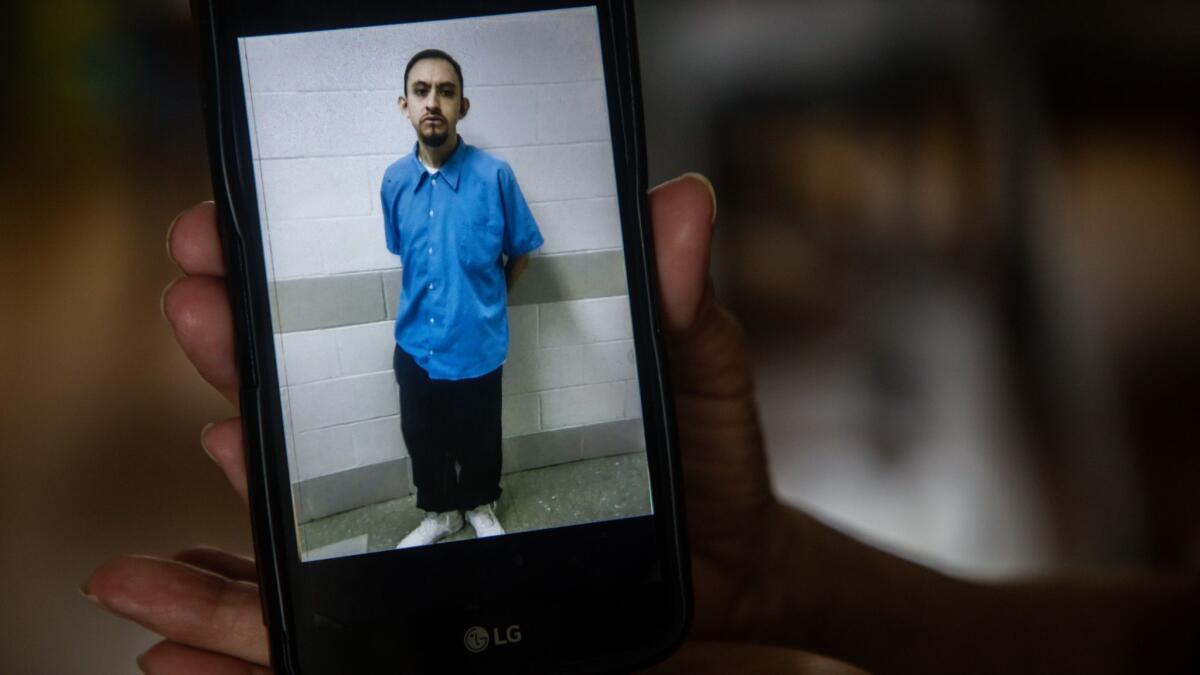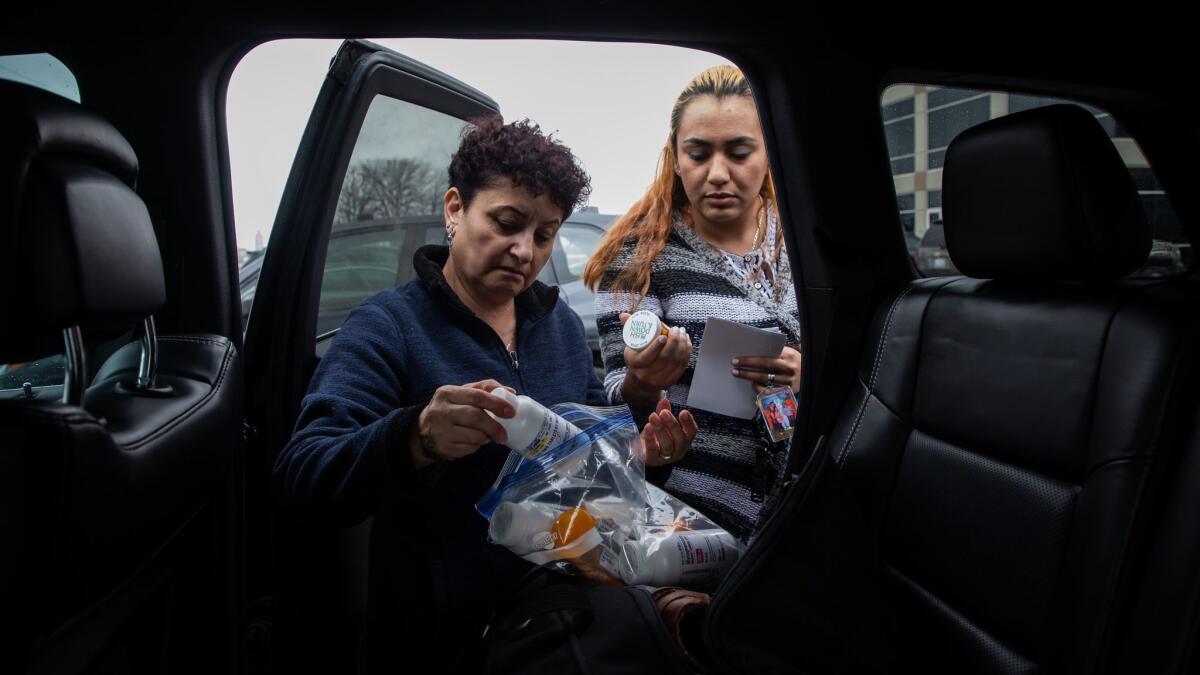Family frets after Chicago-area man diagnosed with cancer is deported to Mexico

The family of Luis Ugalde-Pacheco worried that he would die in immigration custody. Now they fear he will die in a country he barely knows.
Ugalde-Pacheco, 28, who was recently diagnosed with non-Hodgkin’s lymphoma and given months to live, was deported to Mexico on Friday, according to his attorney. He’d called Chicago’s southwest suburbs home since he was about 7 years old when he came to the United States illegally with his father, said Lourdes Cristina Pacheco, his mother.
In March, he was placed into the custody of U.S. Immigration and Customs Enforcement, which began deportation proceedings. That was after he completed a two-year prison sentence for felony convictions of intimidation and aggravated battery for threatening and pushing a woman.
It was at the end of that prison stint that he was diagnosed with cancer, according to medical records provided by his attorney. Since then, his advocates have fought for him to receive medical treatment for his lymphoma, which they say ICE did not provide.
But their efforts shifted abruptly this week when they learned that ICE planned to deport him to Mexico, which apparently happened on Friday, though the immigration agency did not confirm that.
Thursday, his mother and his girlfriend, Elida Arriaga, had rushed to the Kankakee County Jail, where ICE was holding Ugalde-Pacheco, to drop off a bag of clothing for him. His mother — worried about where her son would end up and whether she will see him again — shed tears outside the jail.
I feel helpless, I feel desperation. What did I do to God? What did I do in life? Why did it have to be my son?
— Lourdes Cristina Pacheco, whose son, a cancer patient, was deported by ICE this week
She said she’s been scrambling to find any relative in Mexico who can help her son once he arrives. The family is originally from Temascalcingo in Mexico state, more than 600 miles from the U.S. border. Ugalde-Pacheco hadn’t been back to Mexico since the family migrated to the Chicago area about 20 years ago.
“I feel helpless, I feel desperation,” Pacheco said in Spanish. “What did I do to God? What did I do in life? Why did it have to be my son?”
ICE declined to comment about whether Ugalde-Pacheco received medical treatment in custody. The agency pointed to its detention standards, which say immigrants are supposed to receive medical screenings within 12 hours of detention, be given care based on their needs and have access to 24-hour emergency care.
In a statement, an ICE representative noted that Ugalde-Pacheco was taken into custody by the agency after serving his prison sentence. It’s not uncommon for ICE to deport noncitizens with felony convictions.
Clara Long, a senior researcher at Human Rights Watch, worked on a report published last summer about medical care in immigration detention centers. She believes detained immigrants should receive access to adequate healthcare as a basic human right.
The report found that those detained with complex medical conditions experienced delays in getting referrals for medical care from specialists, which typically have to be approved by an official in Washington, D.C., Long said.
The study cited the case of Raul Ernesto Morales Ramos, who had been diagnosed with gastrointestinal cancer and died while in ICE custody. He was in detention for two years, but he didn’t see a doctor until about a month before he died, according to the report.
Long cited Ramos’ case as an example “of the kind of disregard that we found in the system for actually responding to these health and safety issues.”

Ugalde-Pacheco, who is the father of two young children, was diagnosed with cancer while still in the custody of the Illinois Department of Corrections following his conviction in Will County. On Tuesday — a month after he was placed in ICE detention — he saw an oncologist, who told him he has six months to live, said his attorney, Amina Najib.
She had filed a request seeking Ugalde-Pacheco’s conditional release due to a serious medical condition, arguing he doesn’t pose a threat because of his illness. The request was denied, and Ugalde-Pacheco waived his right to appeal a deportation order, Najib said.
“He ultimately can’t take it anymore,” she said. “He’s afraid he might end up dying in [detention].”
Najib said she thinks Ugalde-Pacheco’s case is a direct result of President Trump’s immigration policies, which give officials little room to exercise discretion when deciding if someone should be allowed to stay in the country.
To Najib, Ugalde-Pacheco’s deportation seems rushed compared with past cases she’s handled. She believes the severity of his illness might actually have hastened his deportation.
“It serves our government if they can get him out of detention as quickly as possible because then he’s not a liability anymore. Right now he is,” Najib said.
Pacheco has kept in touch with her son by phone. She said he told her that he felt like his body was on fire.
“If I leave, I’m going to die on the outside,” Pacheco said her son told her. “If I stay, I’ll die inside. I know the problem with cancer that I have, and they aren’t doing anything.”
Ugalde-Pacheco’s current legal troubles started in May 2017, when he was charged in a domestic violence case involving a female relative. She obtained a protective order against him, and he was later charged with violating the order by sending her a text message, according to court records.
He was ordered to complete domestic violence counseling, court records show. Ugalde-Pacheco was taken into ICE custody around that time, but he was released after posting a $4,000 bond, according to his attorney’s petition.
Ugalde-Pacheco’s later stint in prison resulted from different domestic violence allegations from March 2018 involving another woman. She, too, sought a protective order, and he was later charged with violating that order, too, by texting her a photo, according to court records.
On Aug. 20, 2018, Ugalde-Pacheco pleaded guilty to felony charges of intimidation and aggravated battery, records show. He admitted following the woman to her job, showing her a gun, threatening to shoot her if she called police and pushing her, according to court records.
As his deportation loomed, his loved ones worried about whether he will have access to medical treatment in Mexico — and whether they’ll ever see him again.
“I think everyone deserves a chance to … stay here,” Arriaga said, “the chance to live.”
Malagon writes for the Chicago Tribune. The Tribune’s Zbigniew Bzdak contributed to this report.
More to Read
Start your day right
Sign up for Essential California for news, features and recommendations from the L.A. Times and beyond in your inbox six days a week.
You may occasionally receive promotional content from the Los Angeles Times.






